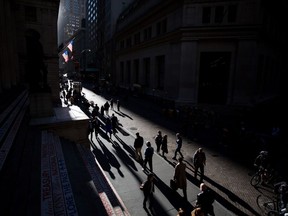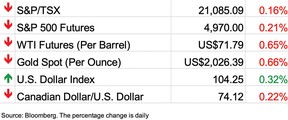Live news: Manulife backs down on Loblaw specialty drugs deal after backlash

The latest business news as it happens

Article content
Today’s headlines
Advertisement 2
Story continues below
Article content
Article content
Top story
Manulife to cover specialty drugs at any pharmacy after backlash over Loblaw deal
Manulife Financial Corp. says patients who require specialty drugs will be able to fill their prescriptions at any pharmacy after backlash sparked by the insurance provider signing an exclusive arrangement with Loblaw Cos. Ltd.
Manulife Canada chief executive Naveed Irshad says the company listened to concerns expressed by patients over the past week and wants to ensure all Canadians under its coverage “have choice, access, and flexibility in managing their health.”
In an update posted to its website, Manulife says it’s implementing the change “swiftly.”
The insurance provider told patients last month its specialty drug program would transition to being carried out “primarily” through Shoppers Drug Mart and other Loblaw-owned pharmacies. Manulife had previously also covered specialty drugs through national home and community health-care provider Bayshore HealthCare.
The program affects around 260 medications meant to treat complex, chronic or life-threatening conditions such as rheumatoid arthritis, Crohn’s, multiple sclerosis, pulmonary arterial hypertension, cancer, osteoporosis and hepatitis C.
Advertisement 3
Story continues below
Article content
Industry Minister Francois-Philippe Champagne said last week he was concerned about the deal and that the companies involved “don’t get the message” about the need for increased competition.
— The Canadian Press
2:30 p.m.
‘Own dividends, own inflation, own Canada’: says BofA

Canadian stocks are attractive, given the dividend growth that the benchmark S&P/TSX composite index offers and the prospect of waning disinflationary pressure, says Bank of America Corp.’s Ohsung Kwon.
“Own dividends, own inflation, own Canada,” the strategist wrote in a Monday research note. “2024 could be a banner year for dividends as cash yields drop and a global recovery cycle lifts beaten-down high-dividend stocks.”
The S&P/TSX Composite index dividend yield of 3.2 per cent is just over two times the level offered by the S&P 500, a record spread, according to BofA.
Still, it would take higher commodity prices for Canada’s benchmark to post “meaningful outperformance” relative to its United States counterpart, the S&P 500, according to Kwon.
But Kwon sees plenty of appeal in the S&P/TSX Composite, which trailed the U.S. gauge in 2023 as disinflation took hold, but outperformed it in 2022 as inflation was a dominant theme.
Article content
Advertisement 4
Story continues below
Article content
Given that much of the disinflation in this cycle has already taken place and with the bank expecting Canada’s economy to close the growth gap with the U.S., the Canadian benchmark “offers a great entry point” at 15 times earnings per share, Kwon wrote. The multiple for the S&P 500, which has been advancing in large part led by Big Tech shares, is around 22.
The outlook for inflation and geopolitics are the two biggest risks that investors see for equities this year, and Canada could offer a hedge against both, especially given current global tensions, according to the research.
Kwon pointed out that the TSX’s three historical upward cycles relative to the S&P 500 came during inflationary periods, and two were in wartime, including in the 1940s.
— Bloomberg
1:30 p.m.
Alberta says Ottawa’s oilsands emissions cap ‘will not be tolerated’

Alberta says a federal emissions cap on greenhouse gases “will not be tolerated” as the province’s environment minister meets today with her federal counterpart.
Alberta’s formal response to Ottawa’s proposal says the cap would undercut the work that the province has been successfully pursuing “for decades” to reduce emissions.
Advertisement 5
Story continues below
Article content
The response says oilsands production has already risen above the forecasts that were used to establish the proposed 100-megatonne limit.
It says the technology needed to bring emissions down enough doesn’t yet exist.
The document repeats arguments that Ottawa’s plan violates the Constitution.
Alberta is one of the few places in North America with rising greenhouse gas emissions, and recently set a record for production from the oilsands.
The Canadian Press
Noon
Midday markets: TSX falls more than 200 points

Canada’s main stock index was down more than 200 points in late-morning trading in a broad-based decline, while U.S. stock markets also tumbled lower.
The S&P/TSX composite index was down 226.23 points, 1.06 per cent, at 20,858.86.
In New York, the Dow Jones industrial average was down 0.91 per cent at 38,305.44. The S&P 500 index was down 0.56 per cent at 4,931.16, while the Nasdaq composite was down 0.45 per cent at 15,559.00.
The Canadian dollar traded down 0.47 per cent at 73.88 cents US compared with 74.33 cents US on Friday.
The March crude contract was down 0.09 per cent at US$72.21 per barrel and the March natural gas contract was down two cents at US$2.06 per mmBTU.
Advertisement 6
Story continues below
Article content
The April gold contract was down 0.75 per cent at US$2,038.30 an ounce and the March copper contract was down five cents at US$3.77 a pound.
— The Canadian Press
10:36 a.m.
Oil price falls as bets for Fed rate cut pushed back

Oil switched from gains to losses, with United States Federal Reserve chair Jerome Powell having quelled expectations that interest rates will fall in March.
U.S. crude futures were little changed, while treasuries declined and the dollar rose, making commodities priced in the currency less appealing. Powell flagged the dangers of the Fed cutting rates too soon in an interview on CBS’s 60 Minutes on Sunday.
That undermined earlier price gains after American forces launched attacks against Yemen’s Houthis, following strikes on Iranian forces and militias in Syria and Iraq late last week. The weekend’s bombardments marked the biggest targeting of the Houthis since an initial operation on Jan. 11 as part of an effort to end attacks on commercial ships in the Red Sea.
Crude slumped last week — erasing almost all of this year’s gains — amid talks to pause the four-month Israel-Hamas conflict, though U.S. National Security Advisor Jake Sullivan said on Sunday that an agreement isn’t imminent. Earlier in the week, speculators had embarked on one of their biggest additions to bullish bets in the global Brent benchmark for years, leaving the possibility that funds cutting back those positions could have been a driver of the pullback.
Advertisement 7
Story continues below
Article content
“Oil prices enter the week trying to regain a little composure after concerted U.S.-led air strikes switched from targets in Syria and Iraq to those of Houthi aggressor sites in Yemen over the weekend,” said John Evans, an analyst at brokerage PVM Oil Associates Ltd. “Adding to the oil price demise was a real sea-change in what might occur in interest rates.”
Elsewhere, a sizable amount of refining capacity is likely to be offline after a fire at the Lukoil PJSC facility in Russia’s Volgograd over the weekend, blamed on a downed drone from Ukraine. Diesel futures jumped as much as 1.8 per cent on Monday, the most in a week.
— Bloomberg

10:12 a.m.
Markets open: Stocks in the red

U.S. stocks are slipping Monday as Wall Street pushes out forecasts for when interest rates will start easing from the strictest levels in two decades.
The S&P 500 was 0.3 per cent lower in early trading, coming off another all-time high and another winning week. The Dow Jones Industrial Average was down 0.9 per cent, and the Nasdaq composite was 0.55 per cent lower.
Earnings season is near its midpoint, with roughly half the companies in the S&P 500 having reported their latest results.
Advertisement 8
Story continues below
Article content
Companies that have been missing analysts’ estimates for earnings this reporting season have been seeing their stocks get punished even more than usual, according to strategists at Bank of America.
Stocks broadly felt some pressure from another rise for yields in the bond market. They rose as traders on Wall Street delayed their expectations for when the Federal Reserve will begin cutting its main interest rate.
In Canada, the S&P/TSX composite index was down 0.73 per cent with the majority of its sectors in the red.
— The Associated Press
7:30 a.m.
Ottawa extends foreign homebuyer ban for another 2 years

Canada has lengthened a ban on foreign homebuyers for two additional years as the real estate market begins to show signs of a rebound, stoking concerns about the cost of shelter in cities like Toronto and Vancouver.
Prime Minister Justin Trudeau’s government acted to prohibit non-Canadians from buying residential real estate in 2022, with the measure to expire on Jan. 1, 2025. That date has now been moved to Jan. 1, 2027.
“By extending the foreign buyer ban, we will ensure houses are used as homes for Canadian families to live in and do not become a speculative financial asset class,” Finance Minister Chrystia Freeland said in a statement Feb. 4, adding that the government is concerned about residents being priced out of their local housing markets.
Advertisement 9
Story continues below
Article content
The government has carved out exemptions for non-Canadians buying vacant land or residential property for development. There are also exemptions for foreign students and people on work permits, provided they have been in the country for an extended period and have not already purchased property.
Activity in the housing market has begun to heat up recently as it becomes clearer than the Bank of Canada may be in a position to cut interest rates later this year.
The national benchmark home price in December was $730,400, an increase of 36 per cent in five years. It’s $1.2 million in greater Vancouver and $1.1 million in greater Toronto.
— Geoffrey Morgan, Bloomberg
7:30 a.m.
Stock markets before the opening bell

Bonds fell and the dollar rose as United States Federal Reserve chair Jerome Powell continued to push back against any hopes of lower interest rates.
U.S. 10-year yields climbed seven basis points to 4.09 per cent, extending moves that started on Friday after a blockbuster jobs report. Yields on debt from Australia to Germany rose. The Bloomberg Dollar Index traded near a two-month high and oil prices retreated.
Advertisement 10
Story continues below
Article content
Meanwhile, global stock markets were mixed. In the U.S., S&P 500 futures dipped, while European shares edged higher, supported by strong earnings from Italian lender UniCredit SpA.
The “danger of moving too soon is that the job’s not quite done,” Powell said in an interview on CBS’s 60 Minutes on Sunday. The comments add evidence to a view that traders have been over-eager in pricing in interest rate cuts and now need to dial back those expectations. Wall Street banks from Goldman Sachs Group Inc. to Barclays PLC are among those that have pushed back their predictions for the timing of the Fed’s first reduction.
The S&P/TSX composite index closed down 0.16 per cent on Friday.
— Bloomberg
What to watch today
Alberta Premier Danielle Smith will give a keynote address at the Economic Club of Canada in Ottawa, starting at 11:45 a.m.
The Bank of Canada will release its market participants survey for the fourth quarter this morning.
On the earnings front, expect reports from McDonald’s Corp., Caterpillar Inc. and TMX Group Ltd.
Recommended from Editorial
Need a refresher on Friday’s’s top headlines? Get caught up here.
Additional reporting by The Canadian Press, Associated Press and Bloomberg
Bookmark our website and support our journalism: Don’t miss the business news you need to know — add financialpost.com to your bookmarks and sign up for our newsletters here.
Article content







Comments